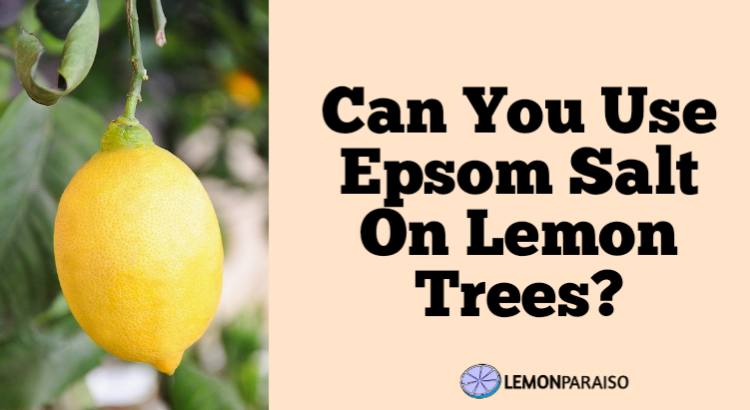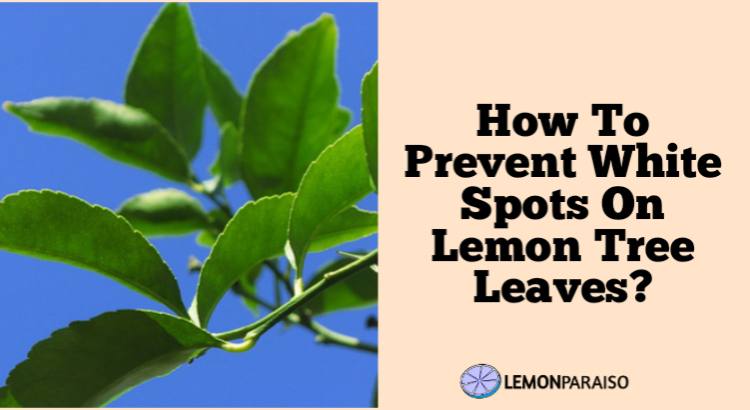Can You Use Epsom Salt On Lemon Trees?

Epsom salt, a naturally occurring compound of magnesium and sulfur, has long been touted for its various benefits in gardening and plant care. Among the plants that can benefit from Epsom salt applications are lemon trees, which are often prone to magnesium deficiencies.
Can You Use Epsom Salt On Lemon Trees?
Epsom salt can indeed be used on lemon trees as a supplementary treatment. The magnesium sulfate present in Epsom salt helps to address magnesium deficiencies, which can hinder a lemon tree’s growth and overall health.
By applying Epsom salt to the tree’s roots, it can help improve nutrient absorption and stimulate new growth. However, it is essential to ensure that the lemon tree receives a balanced diet of other essential nutrients as well, such as nitrogen, phosphorus, and potassium.
Using Epsom salt alone will not provide all the nutrients required for optimal growth and fruit production.
Is Epsom Salt Good For Lemon Trees?
Epsom salt can be beneficial for lemon trees, particularly when they are experiencing a magnesium deficiency. A magnesium deficiency can manifest itself through symptoms like interveinal chlorosis, where leaves turn yellow while veins remain green.
Epsom salt, which contains magnesium sulfate, can help alleviate this deficiency, promoting healthy leaf production and supporting overall tree health.
However, it is important to remember that Epsom salt should not be the primary source of nutrients for your lemon tree, and should only be used as a supplement when necessary.
How Do You Use Epsom Salt On Lemon Trees?
To use Epsom salt on lemon trees, begin by dissolving one tablespoon of Epsom salt in a gallon of water. Once the salt is thoroughly dissolved, you can water the tree’s roots with the solution. It’s essential to avoid getting the solution on the tree’s leaves, as this can cause leaf burn.
Alternatively, you can sprinkle the Epsom salt around the tree’s drip line, and then water the area to help the salt dissolve and reach the roots. Always follow recommended dosages and application guidelines to avoid causing harm to your lemon tree.
How Often Should You Use Epsom Salt On Lemon Trees?
The frequency with which you should use Epsom salt on your lemon tree depends on the tree’s overall health and the presence of a magnesium deficiency. In general, Epsom salt can be applied once every two to three months during the growing season.
However, you should monitor your lemon tree closely for signs of improvement or further deficiency. If the tree’s health does not improve, consult a professional or consider other nutrient imbalances that may be causing the issue.
Can You Use Too Much Epsom Salt On Lemon Trees?
No, it not possible to use too much Epsom salt on lemon trees, it can lead to negative consequences. Overuse of Epsom salt can cause an imbalance in the tree’s nutrient uptake, leading to deficiencies in other essential elements like calcium and potassium.
It can also cause salt buildup in the soil, which can harm the tree’s root system and overall health. To avoid these issues, always follow recommended dosages and application guidelines when using Epsom salt on your lemon tree.
How Does Epsom Salt Help Lemon Trees?
Epsom salt helps lemon trees by providing magnesium, which is a critical nutrient for overall plant health. Magnesium plays a vital role in photosynthesis, allowing the plant to create energy from sunlight.
It also helps in the formation of fruits and the development of strong, healthy roots. By providing additional magnesium through Epsom salt applications, lemon trees can recover from magnesium deficiencies and thrive, producing more abundant and healthier fruits.
What Other Plants Can Benefit From Epsom Salt?
Many plants can benefit from the use of Epsom salt, including tomatoes, peppers, roses, and azaleas. These plants, like lemon trees, are prone to magnesium deficiencies and can benefit from the supplemental magnesium that Epsom salt provides.
When used appropriately, Epsom salt can help improve overall plant health, encourage blooming, and enhance fruit production. However, it’s essential to remember that not all plants require additional magnesium, and you should always monitor your plants for signs of deficiency before applying Epsom salt.
Overuse can lead to imbalances and other problems, so it’s crucial to follow recommended dosages and application guidelines for each specific plant type.
Can Epsom Salt Be Used As A Fertilizer For Lemon Trees?
While Epsom salt can be beneficial for lemon trees, it should not be used as a standalone fertilizer. Epsom salt provides magnesium and sulfur, but it does not supply other essential nutrients like nitrogen, phosphorus, and potassium, which are crucial for a lemon tree’s overall health and fruit production.
Instead, use a balanced citrus fertilizer in combination with Epsom salt, if needed, to ensure your lemon tree receives all the necessary nutrients for optimal growth and fruiting.
Are There Any Risks Associated With Using Epsom Salt On Lemon Trees?
There are some risks associated with using Epsom salt on lemon trees, particularly if used incorrectly or in excessive amounts. Overapplication can lead to nutrient imbalances, causing deficiencies in other essential elements, such as calcium and potassium.
Excessive use of Epsom salt can also result in salt buildup in the soil, which can damage the tree’s roots and impede overall growth. To mitigate these risks, always follow recommended dosages and application guidelines, and monitor your lemon tree’s health closely to ensure it is benefiting from the Epsom salt treatment.
Epsom Salt For Meyer Lemon Tree
Epsom salt, a natural compound comprised of magnesium sulfate, has become a popular supplement for Meyer lemon trees due to its numerous benefits. When added to the soil, Epsom salt can help Meyer lemon trees by enhancing nutrient absorption and promoting overall plant health. Magnesium, a key component of Epsom salt, is vital for the production of chlorophyll, which is responsible for the tree’s ability to carry out photosynthesis.
In addition, Epsom salt can also help prevent leaf yellowing, a common issue faced by Meyer lemon trees when they experience magnesium deficiencies. To use Epsom salt effectively, it’s important to dissolve it in water and apply it to the base of the tree, ensuring that it penetrates the soil for optimal absorption. Incorporating Epsom salt into your Meyer lemon tree care routine can lead to a more robust and fruitful tree, ultimately resulting in a higher yield of delicious and healthy fruit.


